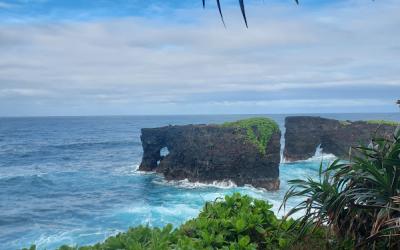Spend four weeks in Sāmoa exploring the impacts of shifting environments and climate change on the people, environment, and culture of Sāmoa and other Pacific nations. This program explores issues such as biodiversity loss, rising seas levels, increasing climate disaster and various environmental justice efforts at community and national levels in response. Indigenous environmental justice efforts in Sāmoa provide a holistic understanding of how community resilience, science, creativity and Indigenous sovereignty works together. Through immersive coursework, collaboration with local communities, and guided excursions, students will engage directly with Samoan scholars, Indigenous leaders, policy-makers, activists and artists, contributing to projects that support Samoan communities in their environmental justice efforts.
Program Highlights:
- Collaborate with Indigenous leaders, policy-makers, and community activists on environmental justice projects.
- Participate in cultural excursions and activities, including homestays and visits to significant local sites.
- Develop and execute a community-based project focused on environmental justice.
The program is divided into three sections:
Section 1: Remote Pre-Program Prep
One week of remote classes to prepare you for the program. This section will include readings, videos, discussions, and assignments to get you prepared for your experience.
Section 2: In Sāmoa
Four weeks living in Sāmoa, where you will stay with host families and engage in a variety of activities including guest lectures, excursions, and collaborative projects with local students and or organizations. This experience will allow you to learn firsthand how climate change is affecting the communities and how they are responding to these challenges.
Section 3: Remote Project Work
After the in-country experience, you will have a one-week break, followed by a remote project phase. During this final stage, you will work on completing your projects, finalizing deliverables, and preparing comprehensive reports for submission to community partners.
This program offers a unique opportunity to understand and contribute to the environmental justice efforts from a deeply rooted Indigenous perspective, striving to make a tangible impact on the communities in Samoa.



